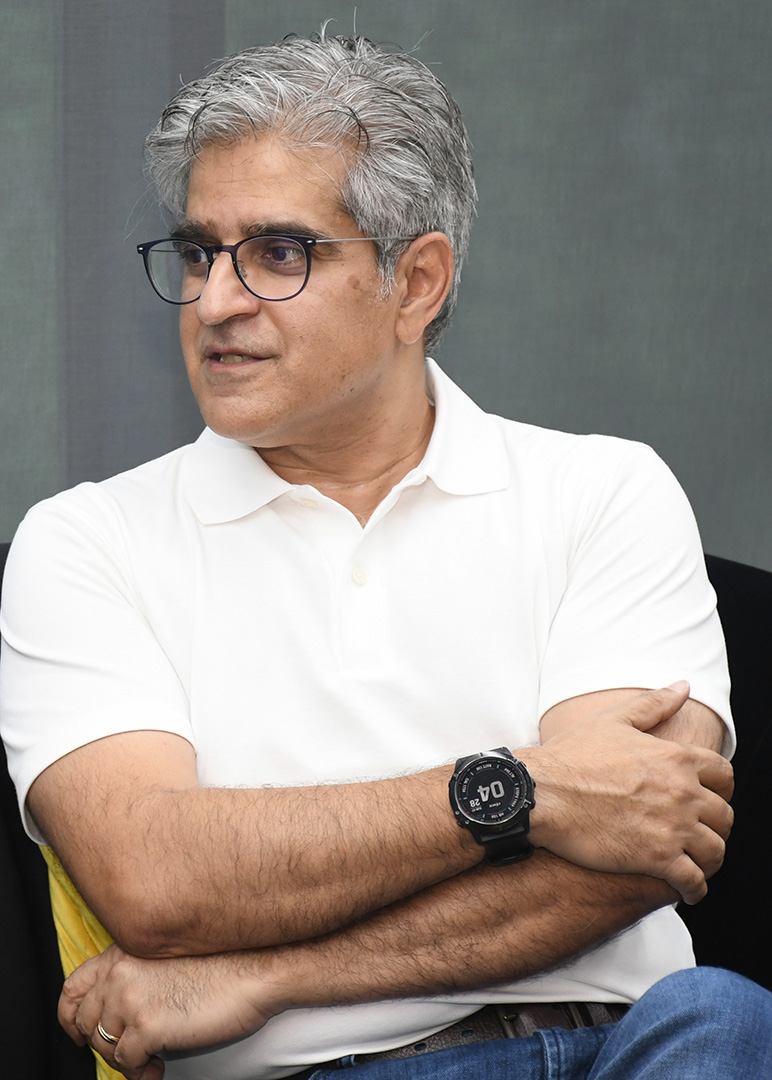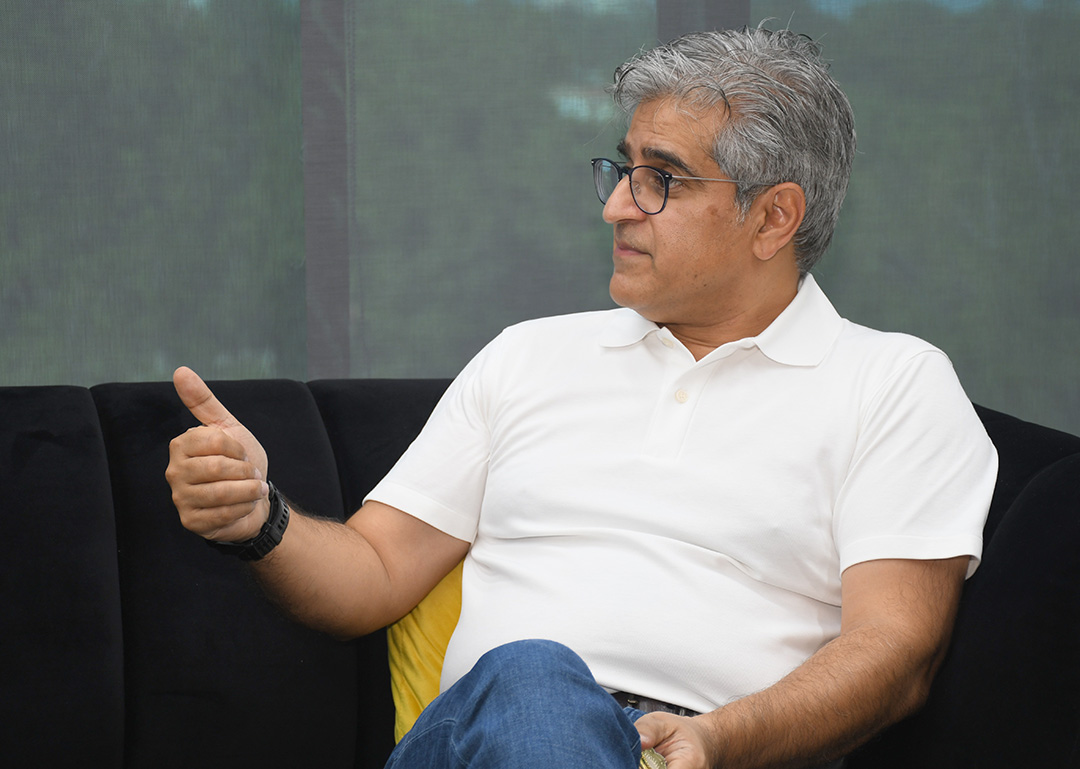Amir Ibrahim, the Visionary CEO Redefining the Industry and Inspiring Millions
Amir Ibrahim, a dynamic leader with nearly 30 years of experience in the telecommunications industry, currently serving as the CEO of Jazz. Starting his career in Pakistan, he played a pivotal role in transforming the company from a traditional telecom provider into a multifaceted service company.
MT: Could you please provide some insight into your career journey and explain how you chose your current direction?
Amir : Growing up in small towns in Pakistan, I moved to Lahore when I was about 10 or 11 years old. My schooling was at Aitchison College, where I aspired to play professional cricket. However, life took me to the US for my undergraduate studies at the University of Texas at Austin. I began in computer science but eventually shifted to accounting. After graduating, I realized that I was a marketer trapped in an accountant’s body, and I found myself drawn more to commercial roles.
Having a solid accounting degree proved invaluable for leading organizations later on. This background, combined with my experience playing competitive sports, particularly team sports, prepared me for the corporate world. Being part of a team emphasized the importance of collaboration to advance the group, rather than focusing solely on individual achievements.
Reflecting on my life, there are key experiences that helped me perform better in my current role. These building blocks were not always appreciated at the time, but in hindsight, they all made sense. After graduating from the University of Texas, I moved back to Pakistan and started working for Mobile Link, a joint venture between the SAF Group and Motorola. I spent the next seven years there, launching a prepaid brand called Jazz, which is now the company I work for.
Subsequently, I returned to academia to pursue an MBA in Switzerland. Afterward, I worked in the automotive industry, spending time in the UK and Dubai overseeing the sales operations for Jaguar and Land Rover, two premium products. Eventually, I moved back to Pakistan with Telenor and then to Thailand. I returned to Pakistan in 2015, and for the past nine years, I have been the CEO of Jazz, a company I started working for 30 years ago.

MT: Who influenced you most in life?
Amir: It’s an interesting question because we are influenced and inspired by people in our family, those we know closely, and also by people we read about. Certainly, my father was a very instrumental figure in my life. His demeanor, passion for helping others, intellectual curiosity, and commitment to excellence in whatever he undertook are qualities I strive to instill in my work ethos.
More importantly, I try to follow his example in being a good human being. This goes far beyond our roles within the office as a CEO or an executive. It’s about whether we are contributory members of society.
MT: What skills or characteristics make someone a seasoned leader in a company?
Amir: I think it varies from person to person and company to company. To me, being authentic is important. It’s crucial to be who you are. Your title should not define you, nor should your role. One must be comfortable in their skin to do the job right.
This, complemented by intellectual curiosity and a genuine interest in people, are characteristics I value when I see them in others. These are also qualities I strive to emulate myself. Whether it’s a recipe for success or not, these are certainly traits I appreciate.
To me, being authentic is important. It’s crucial to be who you are.
MT: What workforce skills or opportunities do you anticipate will be the biggest game changers in the next five years?
Amir : There’s a lot of discussion around AI and how it might replace jobs. I don’t think AI will replace jobs, but someone who uses AI can replace you. Rather than just artificial intelligence, I call it augmented intelligence.
In the workforce, individuals who are better equipped to do their jobs through enhanced research abilities and the use of available technological tools will have an edge over those with a more traditional mindset. I believe smart, hardworking individuals, complemented by technology and technological savviness, will form the super workforce of the future.
Just like 20 or 30 years ago, when using the internet versus not using it made a difference, or later when using Excel versus a calculator was a differentiator, today the same can be said about artificial intelligence. How we integrate AI into our day-to-day activities will be a significant differentiator.

MT: What is your secret to striking a work-life balance?
Amir: Ah, a lot can be said on this topic, and I don’t think anyone has the definitive answer. I call it work-life integration. It’s difficult to compartmentalize your life into separate buckets for work and life. Life happens while you’re working, and work is a part of life. It’s about integration and enjoying both aspects.
If you’re working, my suggestion is to engage in work that is fulfilling and satisfying because of what you do, not just because you need to make a living. Many people think of work as something negative, as something they do just to enjoy life. I believe you need to enjoy those eight or nine hours in the office so that it doesn’t feel like work. It should feel like you’re living a hobby and getting paid for it.
Of course, there are times when you want to be completely switched off and enjoy moments of mindfulness, like being in the mountains or reading a book on the beach. During those times, you don’t want to be connected to any smartphone. But the traditional concept of work-life balance doesn’t work for me.
MT: Do you encourage the traditional eight-hour workday, or do you think people tend to spend much more time in the office?
My perspective is that at different stages of your career, you put in different amounts of hours. You have a transactional relationship with work in the early years of your career, and you have transformational opportunities later on.
I don’t think any significant achievement, whether it’s putting a man on the moon, changing the course of a company, or impacting a society, has ever been accomplished in just eight hours a day. However, there’s nothing wrong with working only eight hours a day, but you need to understand what you do and why you do it.
I’m not glamorizing extra hours; I’m saying you need to enjoy what you do. If you’re an entrepreneur or setting up your own company, the eight-hour rule will not work. In many senior positions within organizations, it doesn’t work either.
MT: What does a typical day look like for you?
Amir: When I’m in Pakistan, a typical day starts at about six. I am at the gym by seven. My first meetings begin at nine or nine-thirty, depending on the day, and it’s a series of engagements, including working with the government. This job requires a lot of stakeholder management and collaboration in policy formulation.
I also have many reviews with my team, who are working on new and exciting projects. So, it’s a mix of stakeholder work, new product development, and typical business operations, where we assess our performance against our goals, customer satisfaction, and competition. I try to head back home by six or six-thirty, sometimes seven. Occasionally, there’s another stakeholder meeting or dinner, but otherwise, I stay at home, catch up on emails, make calls, watch TV, try to have dinner before 8 p.m., read a bit, and then go to sleep to start the next day.
Spending time with future generations is important to me. I visit schools and engage with students, having conversations about their dreams and aspirations. I was in their shoes many years ago, wondering where I would end up and who I would find as a life partner. It’s an exciting time, but unfortunately, I don’t see the level of excitement I would like to, due to various issues such as the country’s current situation, taxes, and security concerns. The enthusiasm I’d hoped for regarding Pakistan’s future isn’t there.
This makes it even more crucial for us to converse with them about hope, energy, and ambition. While we can’t ignore the challenges, expecting someone else to solve all our problems is both unfair and unrealistic. As the current generation, we can’t give up on our country or on a good future for ourselves. We need to act as if we’ll live forever but plan as if we might die tomorrow.
The message I want to convey to the youth and recent graduates is that maintaining positivity is essential. This isn’t about being naively positive, but objectively so, recognizing the challenges while avoiding the trap of negativity. Falling into negativity leads to a downward spiral, and no organization wants to hire someone who is persistently negative. Employers, whether in Pakistan or abroad, seek individuals with energy, drive, and determination to overcome obstacles.
We need a workforce filled with positive, ambitious, and excited individuals. This attitude is desirable at any level—junior, middle, or senior—when discussing careers. We look for people with a twinkle in their eyes and a zest for life. Those who live miserably and negatively will struggle to fake it during interviews.

MT: What are your ongoing projects?
Amir: Jazz is going through a very interesting phase in its journey. We’re almost 30 years old, having started as a telecommunications company that connected people at a time when there were not enough phones and there was a heavy dependency on various channels to get a PTCL connection, or whatever it was called back then.
We revolutionized communication by giving people mobile phones, which were initially seen as luxury items, a rich man’s toy. Today, the mobile phone is a universal tool, not just for communication but as a remote control for our lives. People use their smartphones for education, entertainment, and even to create new classes of entrepreneurs and influencers through platforms like TikTok, Facebook Reels, and YouTube Shorts.
The last 30 years have been transformational for this industry, and we are on the cusp of our next transformation. We are transitioning from being a monolithic, traditional telecom company to a full-fledged service company. The reason I call it a service company and not a tech company is that we want to ensure that servicing people remains core to our DNA. We are expanding into areas adjacent to our existing expertise with smartphones. We aim to be involved in all areas where a customer or citizen uses a smartphone—for information, banking, commerce, health, and much more.
Today, the mobile phone is a universal tool, not just for communication but as a remote control for our lives.
MT: Are there any significant events that differentiate you from other companies and competitors?
Amir: I think we could be part of the same industry, but every company chooses its own path and journey. We have been very intentional about not being limited to just being a telecom company.
We have made a conscious decision to be the “un-telco telco.” We’re not afraid or unhappy to be a telecom company. In fact, we are very proud to be one. But we want to be much more than that. We don’t want to be defined solely by the license we hold. Our commitment to serving customers should be a key part of our identity, and we will obtain any license necessary to fulfill that commitment.
We are a service company. We serve 70 million telecommunications customers, another 20 million banking customers, and 15 million customers who use Masha, our entertainment app. Additionally, 3 million customers buy insurance from us, and another 1 million get their education from the Jazz Pado app. So, we are a service company, with digital as the platform through which we offer our services to customers.
3 Tips for SUCCESS Amir Ibrahim says…
Start with what you have rather than what you don’t have. Many of us still have food on the table, a roof over our heads, clothes on our bodies, and probably a smartphone. In a way, we are quite privileged. This isn’t the case for everyone, but it is for the majority. So, in a sense, we’ve already won the lottery, and we should always be grateful for what we have.
Self-belief is crucial. Great things have happened to ordinary people. They weren’t recognized as exceptional at ten or twenty years old. They were people just like you and me. They chose to put in the effort, often described as the 10,000 hours needed to master a skill. They worked a little harder and didn’t dwell on negativity.
Have a plan for where you want to go.
If your current situation isn’t ideal, identify where you want to be and make a plan to get there. Don’t wait for things to happen by chance. In addition to recognizing your blessings, have a dream to aspire to. Dreams keep people excited and motivated.





